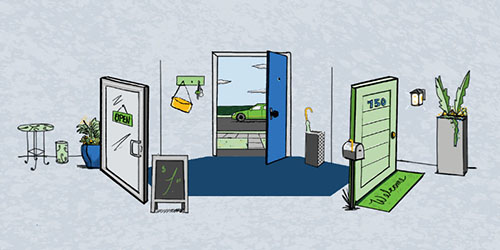Building a strong credit history is important as a newcomer in Canada so you can reach your goals and achieve financial stability. In this article, we'll explore the importance of establishing credit as a newcomer, how it differs from other situations, and provide practical tips to help you build good credit.

Why it's important for newcomers to establish a credit history
Many lenders and service providers in Canada require a credit history, which as a newcomer you may not have yet. Lenders consider factors like payment history, credit utilization, length of credit history, types of credit, and new credit applications when determining whether to lend to you. Establishing a credit history demonstrates your ability to manage credit responsibly and builds trust with lenders, giving them confidence in your financial reliability.
How building good credit habits can help you achieve your goals
By establishing good credit habits, you increase your chances of achieving your financial goals. It opens doors to opportunities such as obtaining a car loan, qualifying for a mortgage, or starting a business. This makes you more likely to be approved for loans, credit cards, and other financial services. Additionally, a positive credit history can lead to better interest rates and financial product terms, saving you money in the long run.
What is a good credit score and how to build one
Credit scores in Canada range from 300 to 900. Generally, a score above 650 is considered good, while scores above 750 are very good or excellent. To build a good credit score focus on these five areas:
- Payment history: Pay your bills on time, including credit card bills, loans, and utility bills.
- New credit applications: Avoid frequently applying for new credit (a car loan, department store credit cards, a new cell phone contract, etc.), as multiple applications within a short period can negatively affect your credit score.
- Credit utilization: Aim to use a moderate amount of your available credit. Keep your credit utilization below 30%.
- Length of credit history: Maintain old credit accounts, even if you no longer use them, to demonstrate a longer history.
- Types of credit: Have a mix of different types of credit, such as credit cards, loans, and lines of credit.
If you'd like to learn more about the basics of credit in Canada, check out Credit 101.
Tools available to build and manage your credit
There are several tools and services to help you build and manage your credit effectively, including:
- Servus's Credit Card Selection Tool: Our user-friendly tool helps you choose the right credit card based on your needs and financial situation so you can start building your credit.
- Online Banking Payments: Manage and pay your bills on time conveniently through online or mobile banking services. You can also set up automatic payments to avoid missed due dates.
- Automated Account Alerts: Enable account alerts to receive notifications of any changes, such as missed payments or unusual activity on your accounts.
- Credit Score Monitoring Services: Consider using credit score monitoring services to keep track of your credit score and receive regular updates on any changes.
Remember, building good credit takes time and consistency, but the rewards are well worth the effort. By understanding the importance of credit, practicing good credit habits, and leveraging available tools and advice, you can establish a strong credit history and feel good about your financial future in Canada.
Take the first step today by inquiring about a Servus Mastercard® and exploring the additional benefits of Servus's Newcomer Banking Package.
More tips to building and maintaining credit in your language: العربية, 简体中文, English, فارسی, Français, ગુજરાતી, हिंदी, 한국어, Melayu, Português, ਪੰਜਾਬੀ, Español, Tagalog, Українська, اردو
Illustration by Amanda Wall

